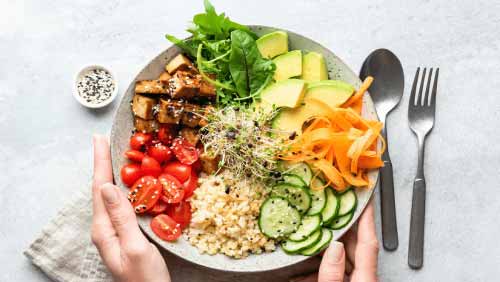There are many important nutrients in a vegetarian diet and many health benefits are associated with a plant-based diet. It is also more sustainable than a meat-based diet. But before starting a vegetarian diet, you should inform yourself about the nutrients of plant-based foods. You can get information from vegetarian websites, a health food store, or a nutritionist. It is best to make a gradual change, focusing on a variety of vegetarian dishes. And remember, the vegetarian diet isn’t as difficult as it might seem; It can be adapted from foods you already know.
Vitamin B12
If you’re a vegetarian, you may be concerned about how to get enough vitamin B12 in your diet. This nutrient is commonly found in dairy products such as milk and cheese, and in some vegetarian foods. Some vegetarians also get their vitamin B12 requirements from eggs, which can be added to salads and omelets. Eggs are also a great source of protein.
If you suspect you may be deficient in vitamin B12, it is best to consult a doctor for a proper diagnosis. In some cases, a lack of vitamin B12 can lead to fatigue. A deficiency of B12 can even damage the nervous system. In addition, babies born to vegan mothers are at high risk of vitamin B12 deficiency, because they need a lot of B12 during their development. The mother’s vitamin B12 stores are rapidly depleted during pregnancy and during the development of the fetus. A vegetarian diet is also beneficial for people over the age of 50, who are at a higher risk of vitamin B12 deficiency due to its reduced absorption capacity.
It is essential to get enough vitamin B12 if you want to maintain a healthy diet. Not only is it necessary for DNA synthesis and red blood cell maturation, but it is also necessary for the production of myelin sheaths around nerves. However, if you’re a vegetarian, you may need to look for vegan sources of this important nutrient.
Iron
Iron is an important nutrient in the diet, but it is not as easily absorbed from plant-based foods as it is from meat. There are many factors that can increase or decrease iron absorption. In addition, there is limited research on the right amount of iron for a vegan diet. Despite this, it is important to include iron-rich foods in your diet and eat foods that promote better iron absorption.
Iron is important for keeping red blood cells healthy. If you don’t get enough iron from your diet, you could be at risk for serious diseases and health problems. However, if you know the benefits of iron-rich foods, you can reduce your chances of iron deficiency. Here are some benefits of eating more iron-rich foods:
Vegetarians should aim to get adequate amounts of iron from plants. A diet rich in whole grains, nuts, seeds, and legumes can help people get enough iron. Vitamin C helps improve the absorption of non-heme iron.
Zinc is one of the important nutrients in a vegetarian diet
While the average person doesn’t get enough zinc from their diet alone, you can increase your intake by including zinc supplements in your diet. These supplements increase your body’s absorption of zinc and make zinc more readily available in your diet. Alternatively, you can consume a variety of zinc-rich foods, including nuts and seeds.
Some studies show that the zinc requirements of vegetarians are 50% higher than those of non-vegetarians. In one study, nearly half of vegans had inadequate zinc levels, compared to just 8 percent of omnivores. The researchers attribute this difference to phytic acid, which inhibits zinc absorption. However, assessing zinc status in vegetarian diets is difficult due to the fact that there are no sensitive clinical tests measuring zinc intake.
The body needs zinc for more than 50 enzymes and many physiological processes. While zinc is not a trace mineral, its deficiency can still have negative consequences on the body. Chronic marginal zinc deficiency can cause several symptoms, including weak bones and anemia.
Calcium is one of the important nutrients in a vegetarian diet
Calcium from vegetarian diets is not as adequate as the amount of calcium from meat or dairy products. The body needs this mineral to maintain vascular and muscle health. In addition to this, calcium is necessary for nerve function. Vegetarians are more likely to lose calcium than non-vegetarians. Although vegetarians can still consume enough calcium, they may have an increased risk of bone fractures.
Dairy-free calcium can be obtained from a variety of sources, including figs, soybeans, and tofu. Soy foods are excellent sources of calcium and contain significant amounts of iron, magnesium, and selenium. Soy products are also excellent sources of fiber and protein.
Calcium-rich vegetables include spinach and kale. While most Americans get all their calcium from dairy products, plant-based foods are a great way to increase your intake. Important nutrients in a vegetarian diet are more easily absorbed than those found in dairy products. However, some vegetables have compounds that block calcium absorption.
Fiber is one of the important nutrients in a vegetarian diet
Fiber is often eliminated from processed foods, so the best way to get enough fiber in your diet is to choose whole foods. This way, you’ll get more fiber per serving and fewer calories. One example is lentils, which have about 15.6 grams of fiber per cup. You can easily include lentils in your diet by adding them to vegetarian soups and burgers. Another great source of fiber is barley. Barley is chewy and tasty, and can also be used to make roasted vegetables, veggie burgers, and pilaf.
Fiber is an important nutrient for the human body. It helps regulate blood sugar levels, regulates cholesterol and provides a feeling of fullness. It also absorbs excess cholesterol, hormones, and toxins, which helps your body eliminate them efficiently. Soluble fiber is found in vegetables, fruits, nuts, and whole grains.
Processed foods
A recent study suggests a connection between highly processed foods and cancer. While the exact cause is unknown, it’s important to avoid processed foods to prevent cancer. While many foods that are considered processed are not actually processed, they may have been manufactured through chemical processes or may include artificial flavors or colors.
The study used data collected from 105,159 adults over a five-year period. It found that a 10% increase in intake of ultra-processed foods was associated with an increased risk of heart disease, stroke and some cancers. The researchers also found that a diet rich in processed foods was associated with higher calorie intake and an increased risk of obesity.
Body mass index
Studies have indicated that vegetarian diets are associated with a lower BMI. The association between a vegetarian diet and BMI is largely conceptual. Several studies have found that a vegetarian diet is more likely to be associated with a reduced BMI than omnivorous diets. The relationship between a vegetarian diet and BMI has also been observed in a number of clinical studies.
The difference in BMI between carnivores and vegetarians is largely explained by differences in macronutrient intake. Vegetarians tend to eat fewer calories than carnivores. In addition, lower BMIs have been associated with lower bone mass. A systematic review of animal-based diets found that lacto-ovo vegetarians and vegans had lower bone mineral density, which is associated with an increased risk of fractures.
Studies have also found that children who eat a vegetarian diet have a lower BMI than their non-vegetarian counterparts. This ratio may be due to the reduced energy density and high fiber content in plant-based diets. Vegetarian children tend to be leaner than their non-vegetarian counterparts and this effect increases during adolescence.
Disadvantages of a vegetarian diet
Many studies have shown that a vegetarian diet can reduce the risk of certain chronic diseases, including heart disease and diabetes. In addition, the diet plan can help lower cholesterol levels and prevent certain types of cancer. However, there are some disadvantages of a vegetarian diet, including the possibility of vitamin and mineral deficiencies.
Meat production is expensive and requires more land, water and energy. Producing one pound of beef may require 20 pounds of grain. As the world’s population grows, it is more efficient to produce food through crops, not meat. Also, vegetarian diets can save money because vegetables are less expensive than meat.
Some people find vegetarian diets difficult to follow. Vegetarians may experience nutritional deficiencies as they must rely on carbohydrates for energy. High-carbohydrate diets increase blood pressure and increase the risk of developing type 2 diabetes. Vegetarians may also experience a lack of vitamins, such as vitamin D and Omega-3 fatty acids, because these are found only in meat.


